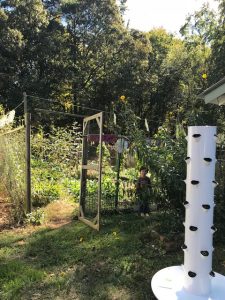
The Food Cupboards garden
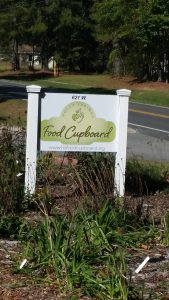
The Food Cupboard
Did you know that Holly Springs has a very busy food bank? They work in conjunction with area grocery stores and the Raleigh food bank. It’s called the Holly Springs Food Cupboard and they serve 1000’s of Holly Spring residents every month. This giving group even has their own garden that produced over 2000 lbs of fresh food last summer! The Holly Springs Food Cupboard welcomes your volunteerism in many ways and even has group projects for your civic and student groups.
Front Porch Realty recently visited the Cupboard’s ribbon cutting with the Holly Springs Chamber of Commerce, to celebrate their recent addition, giving them much needed space to serve their clients.
Thank you to all of the volunteers that make this Cupboard happen. God Bless You!
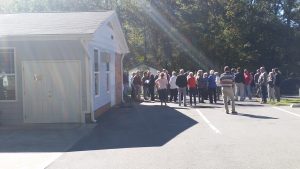
Huge crowd gathered for Holly Springs Food Cupboard ribbon cutting!
FRONT PORCH REALTY has exciting news; we are the #1 LOCAL Independent Real Estate firm in southwestern Wake County!
See our 3rd quarter local real estate market snapshot . It is no surprise that we are still in a seller’s market; inventory is still extremely low across the Triangle. Know that in this competitive market, Front Porch Realty brokers are equipped with professionalism and the expertise to help both our seller and buyer clients navigate multiple offer situations. If we can be of any assistance to you or someone you know, rest assured they will be extremely satisfied.
Please watch our website, Facebook, and Instagram for all housing, and other local news around town and to see our new listings as soon as they hit the market.
If you would rather receive this report either by email or snail mail please contact Laura .

Inventory is low, it’s a great time to sell.
Happy fall!
Laura Moody
Broker/Owner Front Porch Realty
www.FrontPorchRealtyNC.com

Maria has been selling the Triangle since 1991! Real estate is Maria’s passion and she is committed to helping the Latino community. Originally from Chile, Maria’s native language is Spanish and of course she is also fluent in English. Maria has an entire team of Spanish speaking professionals at your service including; inspectors, attorneys, banks and mortgage companies.
Thank you Maria Plazas for all of your dedication as a FRONT PORCH REALTY real estate professional!
What does Maria love most about selling real estate?
“Meeting new friends and clients from all over the country and helping them discover their dream.”
Thank you for being such a great role model at the office Maria!
Maria can be reached at:
Cell: 919.623.7341
Email: mariacplazas@gmail.com

We recently had an opportunity to catch up with Eric Coates of Detailed Home Inspections Inc. about the affects that water can have on your home. Here is what he shared with us.
Water is not your house’s friend!
I really do love my job. However, there are days that I do not like my job. Hurricane Matthew came
through our area in 2016. It dumped 10 inches of rain that day. I had the privilege of performing two
home inspections that day! I am a Boy Scout – so, I am prepared for the rain. I have a good rain suit,
waterproof boots, waterproof equipment/tools, etc. However, having the right equipment does not
make it any easier to work in the rain. Even though I may not like it, I can learn a LOT about a house in
the rain.
Other than people, water causes more problems to a house than any anything else. Your house is made
of many materials that can decay and/or be damaged by water. Water is not your house’s friend! If you
don’t manage the water at your house, it will cause problems. Houses are built to keep water out and
to keep water away. You need to maintain your house so that it keeps the water out and away.
There are many things that you can check yourself. Here is a beginning list. Once you do all of this,
contact me and I will be glad to help you create a longer list!
1. Look through your attic for stains. Take a flashlight up there and scan through the attic looking
for stains. Take a close look at roof penetrations such as plumbing vent pipes, exhaust pipes,
bathroom fan pipes, etc. Turn the lights off and look for signs of light in the attic. Naturally, you
will see light at the attic vents and you may see indirect light at the roof penetrations. But,
make sure you do not have a beam of light coming it. If there is an HVAC unit or a water heater
in the attic, look at the equipment and around the equipment for stains or signs of leaks.
2. Get a pair of binoculars and check out your roof. Stand at a distance and scan back and forth
over your roof. Look for damaged/broken/missing shingles. Look at the roof penetrations for
signs of problems.
3. Look around the exterior at the siding/trim for decay. Decayed wood can allow water
infiltration, which will cause more decay. Water infiltration can cause damage to the structural
components that you cannot see. If wood is cracked, it may not be decayed but it can be on the
path to becoming decayed. Take a close look at areas where two types of materials touch each
other such as siding and wood. Look for cracks/gaps in seams/junctions.
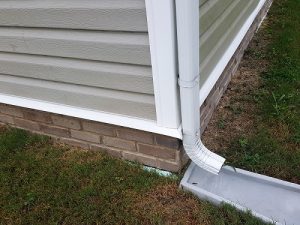
A properly installed gutter and splash block diverts water away from a house.
4. Walk around your house one day in the rain. It is not going to hurt you to get wet! Check to see
how the water is running off the roof and out of the gutters/downspouts. Look at the water on
the ground and make sure that it is draining away from the house. Water NEEDS to run AWAY
from your house.
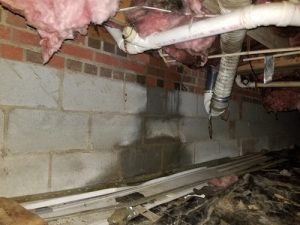
A healthy, dry crawl space should not look like this!
5. Now, here is the hard part – GO IN YOUR CRAWL SPACE! I will tell you ahead of time – there are
spiders in your crawl space. There may be other animals – so, be careful. Make a lot of noise –
talk to yourself and bang on the wood components. Any animal that is in there will want to get
away from you. If you run into an animal, LEAVE! There are many problems that can happen in
your crawl space. Before you go in the crawl space, run water through every plumbing fixture,
i.e. sinks, toilets, showers, clothes washer. Look around the crawl space for signs of water. Is
there condensation on the HVAC air ducts/equipment or the floor structure? Is there water on
the ground/plastic? Is the insulation hanging/dangling/drooping? Does it smell musty?
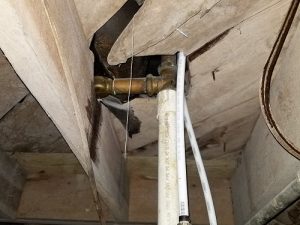
Regularly inspecting your crawl space can help you spot leaking pipes before they have time to do serious damage.
6. When you run water through the plumbing fixtures, look for leaks. Get into the cabinet under
the sinks and look for any leaks. Look around/under the toilet. Look at the ceilings below the
bathroom for stains. Make sure that you don’t have any leaks.
This is a beginning list of things to check. But, this covers a lot of the items that can allow water into
your house. Once you start looking at these items, you will learn what is normal and what is abnormal.
It will get easier with practice. If you have questions, take a picture and send it to us. We will try to help
you with it. If you are not comfortable doing these things, we can help you with that too! Go forth and
check out your house.

Eric Coates
NC Licensed Home Inspector
Detailed Home Inspections Inc.
919-608-3742
inspect@DetailedHomeInspections.com
www.DetailedHomeInspections.com

Front Porch Realty recently sat down and spoke with Corey Mullen, at Clay Hamilton’s State Farm Insurance in Fuquay Varina, about the importance of having homeowners insurance and how it works.
Your home is your refuge after a long day of work. It’s the hub of everything that really matters, where you can relax with your family. So you shouldn’t trust just any company to protect it. You should go with an insurer with the financial strength to cover a wide variety of losses, trusted by more homeowners than any other insurer. That’s State Farm®. When the unexpected hits home, a good neighbor can help.
Think of homeowners insurance as financial protection for what the future might bring. For example, if your home were damaged by a fire, or burglars broke in and stole your belongings, your policy could help pay to rebuild your home or replace your possessions.
Without a policy, you’d have to cover those expenses out of your own pocket. So if you’re a homeowner, homeowners insurance is an absolute necessity.
Your policy could help pay for a variety of property and liability claims:
Property
• Your house: This includes your home and other structures on your property, such as a detached garage or a shed.
• Your possessions: This includes personal belongings inside your home, such as your clothing, furniture, and electronics—and with limitations—certain valuables. It could even cover belongings you take with you while away from home.
Liability
• Financial protection against lawsuits: In certain situations, your State Farm Homeowners Policy could help protect your finances by paying for damages which you’re legally responsible for, and even your legal defense. For example, the policy could help cover legal defense costs if a visitor accidentally got hurt at your place and took you to court.
Other costs covered by the policy
Your policy may also help pay for:
• Removal of your damaged property after a fire, or other loss covered by the policy.
• Temporary repairs necessary to protect covered property from more damage.
• Extra expenses for your household to live elsewhere, if your home is uninhabitable because of damage covered by the policy.
• Water damage caused by flood.
• Liability for business-related activities
• Liability for intentional injury or property damage
• Damage caused by earthquake or mudslide
You may want to talk to your agent about a separate earthquake policy.
With coverage directly through the federal government. There is generally a 30-day waiting period for the policy to go into effect
A “deductible” is the amount that you are responsible for when you file a claim. Your deductible can be a fixed amount, such as $1,000 or $2,000, or a percentage of the coverage amount, such as one or two percent. So if your home is covered for $200,000 and you have a one percent deductible, your deductible is $2,000.
Here’s how a deductible works: say you file a claim for $10,000 after a burglary, and you had chosen a fixed amount deductible of $1,000. So the policy covers you for $9,000 and you are only responsible for $1,000.
Generally, the higher your deductible, the lower your premium. But with a higher deductible, your financial responsibility would be higher if you file a claim. Your agent can help you determine the deductible that’s right for you.
Your State Farm Homeowners Policy has coverage limits on certain types of property, such as computers, collectibles, jewelry, and other valuables.
Here’s an example: Suppose your home had been broken into and your computer and printer were stolen. If the policy limit for home computers and equipment was $5,000, the policy would reimburse you up to that limit after your deductible has been met.
The choice is yours, but State Farm recommends you choose a coverage limit at least equal to your home’s estimated replacement cost: the amount necessary to rebuild your entire home. (The replacement cost isn’t the same as the market value, which is the price you can expect your home to yield on the market.)
If you choose a coverage amount less than the estimated replacement cost, you may not be eligible for certain coverages. Since no one can say what the exact cost will be to replace your home in the future, you’ll need enough coverage to account for unforeseen circumstances.
For a replacement cost estimate, you can ask a contractor, hire a professional replacement cost appraisal service, or ask your State Farm agent to help you develop an estimate. Make sure to point out any architectural details or unique building materials that affect your estimate.
As your life changes, your home may change along with it. We recommend you review your homeowners’ coverage if:
• You move, improve your existing home, or build a new home.
• You add a fire and/or burglar alarm system.
• You purchase items—such as home computers, jewelry, and furs—that might exceed your basic coverage.
To help make sure your coverage is up to date, it’s a good idea to review your policy with your agent every year.
Extra coverage you just might need. Depending on your situation, you may need separate, broader coverage for additional financial protection.
| Have concerns about your personal liability? | A Personal Liability Umbrella Policy (PLUP) for extra liability coverage in increments of $1 million, in case you’re sued for damages that exceed your State Farm Homeowners or Auto Policy liability limits. |
| Own jewelry, fine arts or other valuables? | Other policy options or a Personal Articles Policy (PAP), which can give you higher coverage limits or broader protection. |
| Work out of your home? | Other policy options for home business coverage, which may cover your business-related property and liability. You may also want to consider a separate, more comprehensive business policy for your home-based business. |
| Want to protect yourself against identity fraud? | Adding the Identity Restoration Coverage Endorsement to your State Farm Homeowners Policy. It offers coverage for specific expenses caused by identity fraud and case management services to help counteract the effects of identity fraud. |
Clay Hamilton and Corey Mullen are available to answer all of your insurance questions.
![]()
STATE FARM® INSURANCE AGENT, FUQUAY VARINA, NC

1000 N Main Street Suite 101
Fuquay Varina, NC 27526
Phone: 919-586-7828

Cory Mullen, Insurance and Financial Sales Advisor
1000 N Main Street Suite 101
Fuquay-Varina, N.C 27526
Office 919-586-7828
Cell at 919-356-3607